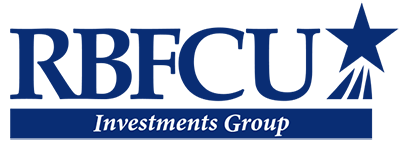Estate Planning Strategies and Your Financial Plan: The Basics
When you hear the words “financial plan,” you might first think of actions like saving for retirement, putting away money for college, managing investments, or reducing debt. However, estate planning strategies can be an important part of it, too.

In fact, estate planning strategies, tools and techniques can help preserve wealth, transfer hard-won assets, and provide financially for loved ones.
"Your financial plan is a roadmap to help you meet your long-term financial goal, whether it’s debt reduction or building your retirement savings," said Terence Powell, Jr., AIF®, Investment Program Manager for RBFCU Investments Group. "And your estate plan? It offers the opportunity to address what you want to do with those assets when you’re no longer with us.”
In other words, while you’re focused on meeting big-picture financial and life goals, your estate plan spells out your wishes on how you would like your assets to be managed and distributed to beneficiaries.
Of course, most people assume that estate planning strategies are designed solely for wealthy people. Yet anyone who has accumulated assets — and many of us will have done so by midlife — can find these methods and techniques help foster more peace of mind.
This can be especially true for people with minor children or financially dependent adult family members. Plus, an estate plan can help someone tackle potentially critical issues such as guardianship and special needs care.
What does an estate plan consist of?
An estate plan may include several documents that collectively outline how your assets, property and financial affairs will be managed, distributed or overseen in the event of your death or incapacity. It can also include simple administrative actions, such as ensuring that you have beneficiary designations on all of your financial accounts.
As you prepare to create an estate plan,1 you might want to take an inventory of your assets — retirement and pension plan amounts, investment accounts, cars, real estate property (e.g., houses or land), credit union account details, and life insurance policies — and create a list of the beneficiaries whom you’ve selected to inherit each of them.
This initial inventory can be a crucial step in determining what estate planning strategies you might need to pursue. And don’t forget to consider directives related to your personal health and end-of-life care. Those details can be included in your estate plan, too.
"Ideally, the estate planning strategies you implement will be tailored to your specific needs in line with your personal family dynamics," Powell said. "For instance, if you’re young and newly married, you may find that you only need a simple will. If you have minor children, substantial assets, or complicated relationships between your beneficiaries, you might want to consider creating a trust. Some people may decide to combine several different solutions. For example, they could create multiple trusts and transfer money each year to a grandchild’s college savings account.”
Powell added that, much like your overall financial plan and the strategies and solutions you employ to help advance it, your estate plan may change depending upon your stage of life — and where you are on your personal financial journey.
“You may want to adapt it as your family grows or in the wake of change, such as a divorce or death of a spouse," he noted. “If you’ve recently inherited assets from your parents or grandparents, you might want to make adjustments to your estate plan as well.”
What documents are commonly included in an estate plan?
A will may be the most familiar type of estate planning document, but trusts, powers of attorney, guardianship designations, beneficiary designations, and letters of intent can be useful to consider with your lawyer.
“It’s important to note that, by collaborating with a core team comprised of your financial advisor, an attorney, and a tax professional, you can identify which documents and strategies are most appropriate for your goals and objectives,” Powell said. “When considering a trust, you may even benefit from a relationship with a trust administrator, also referred to as a ‘trust officer.’”
Remember, too, that you’ll want to personally review your estate plan and the component documents regularly. This can help ensure that your estate plan evolves as you move through life.
How might my estate planning strategies fit into my overall financial plan?
Again, a financial plan can help focus your attention and strategies on specific fiscal goals. Your estate plan can direct what should be done with the assets you’ve worked so hard to create.
“I like to think of an estate plan as the apex of your financial plan,” Powell said. “Ideally, both should reflect your vision, values, needs and goals for you and your family.”
For individuals hoping to reduce annual or estate tax obligations,2 a number of tools and techniques are available, such as placing assets into a trust, giving large monetary gifts to family, and making significant charitable contributions.
“It can be very worthwhile to work with a tax professional on your estate plan, someone who can help you consider the advantages and disadvantages of different actions. For some people, it may be advantageous to transfer assets through different methods over many years,” Powell said. “If you’ve never worked with a tax professional before — or an attorney or trust officer, let your financial advisor know. They may be able to provide referrals.”
How can an estate plan help clarify how my assets are managed and distributed?
Ensuring that the money, property, heirlooms and investments you’ve collected over time eventually will be distributed the way you want is important to many people, especially as we age. An estate plan3 can be designed to specify exactly how you wish for that distribution to take place.
“Typically, if there are assets to transfer, most asset distributions can be detailed in a will or through a trust. That may involve naming an executor or trust administrator,” said Powell, noting that, if you do not put provisions in place and fail to name an executor in advance, a probate court may name one for you.
“At a minimum, even if your estate will be very modest, you may want to talk with your financial advisor about naming a beneficiary on your investment accounts.”
How can an estate plan protect my preferences?
An estate plan reflects the personal goals and values4 related to money that you want to remain in place after you are gone. Far too often, however, people put off estate planning because they’re busy or simply cannot imagine no longer being around for their families.
But it’s not unheard of for a seemingly healthy person — someone upon whom several people rely financially — to perish far too young, either due to illness or accident.
“This is an important thing to remember, especially for anyone who is responsible for minor children and dependent adults, in addition to a spouse or partner. An estate plan can help the people you care about most in the world,” said Powell.
Other decisions may be whether to keep the details of your estate settlement private.
“Again, without an estate plan, you risk having a probate court make decisions for you regarding your heirs and how your assets will be dispersed,” said Powell. “Fortunately, there are methods that can help prevent that from happening.”
He added that estate planning can be a daunting subject for some people to undertake, but there may be a sense of relief in the wake of addressing it. "If you tackle these topics now,” said Powell, “you may alleviate pressure and potential confusion later. And that can help everyone, including you, feel more confident about whatever the future might hold.”




